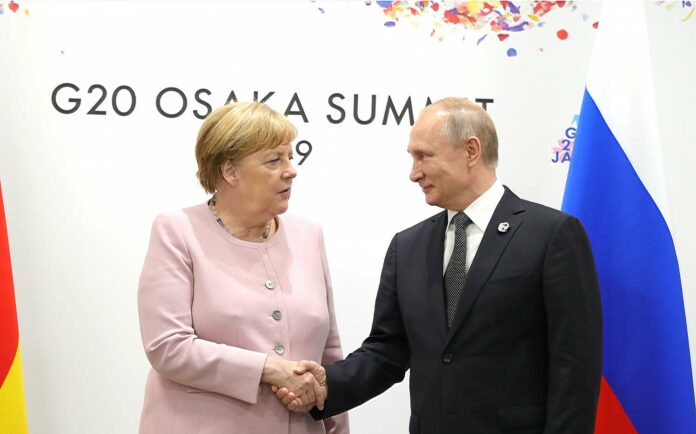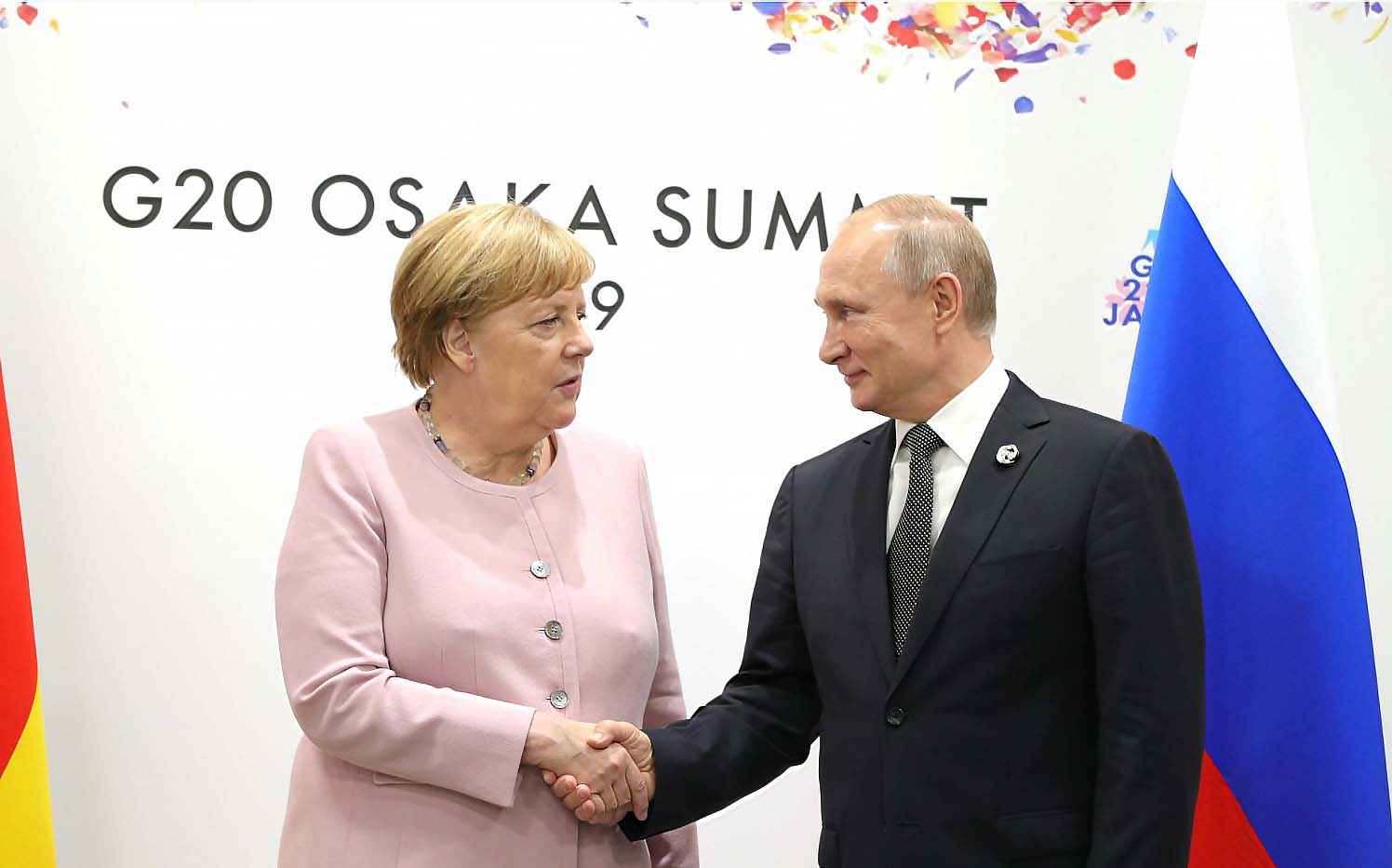Desk Russie publishes the Open Letter by 73 German Experts on Eastern Europe and International Security, first published in German by “Zeit Online”, on 14 January 2022. Renowned scholars address the Government and political parties represented in the German Parliament. Exposing a destructive and aggressive Russian policy, this important document might finally induce the German government and a very influential German business community to better evaluate the threat posed by the Kremlin to the whole western world.
Massive, threatening troop concentrations on Ukraine’s eastern and southern borders, intense anti-Western propaganda attacks that do not shy away from lies, as well as patently unacceptable demands on NATO and its member states: In recent weeks, Russia is fundamentally questioning the security order that has been in place in Europe since the end of the Cold War. In its international self-portrayal, Russia presents itself as a threatened state that urgently needs “security guarantees” from the West. The Kremlin is deliberately shifting the meaning of the concept of security assurances. The need for such guarantees has been discussed since the negotiation of the Nuclear Non-Proliferation Treaty in 1968 regarding the protection of non-nuclear-weapons-states and not of nuclear-weapons-states.
There are now more atomic warheads stored in Russia than in NATO’s three nuclear-weapons-states — the United States, Great Britain, and France — combined. Moscow maintains a wide range of delivery systems for its thousands of nuclear weapons, from intercontinental ballistic missiles to long-range bombers to nuclear submarines. It has one of the three most powerful conventional armies in the world, as well as veto power in the UN Security Council. The Russian Federation is thus one of the militarily most secure states in the world.
The Kremlin uses regular and irregular troops, as well as Russia’s nuclear threat potential, to wage various wars and permanently occupy territories of former Soviet republics. Not only in Eastern but also in Western Europe as well as on other continents, the Kremlin unabashedly demonstrates a claim to special rights to enforce its interests on the territory of sovereign states. Circumventing international rules, treaties and organizations, Moscow hunts its enemies around the world. The Kremlin tries to undermine electoral processes, the rule of law and social cohesion in other countries with propaganda campaigns, fake news, and hacker attacks, among other things. The latter is done partly in secret, but with the obvious goal of obstructing or discrediting democratic decision-making in pluralistic states. In particular, the political and territorial integrity of democratizing post-Soviet transition states is to be undermined.
As Europe’s largest economic power, Germany has been watching these activities critically but largely inactively for three decades now. In Moldova, Moscow’s imperial revanche began as early as 1992, immediately after the collapse of the USSR, with an armed intervention by the 14th Russian Army. Its remnants are still officially in Transnistria today, despite repeated demands by democratically elected Moldovan governments to withdraw and corresponding promises by the Kremlin. The Federal Republic did not react adequately neither to this nor to the following numerous revanchist adventures of Russia in the post-Soviet space and beyond,.
Moreover, Berlin’s foreign and foreign economic policy has contributed to the political and economic weakening of Eastern European non-nuclear-weapons-states and to the geo-economic strengthening of an increasingly expansive atomic superpower. In 2008, Germany’s role was central in preventing Georgia and Ukraine from joining NATO. In 2019, on the other hand, the German government pursued the readmission of the Russian delegation to the Parliamentary Assembly of the Council of Europe, even though Moscow had not fulfilled in the past, and does not fulfill actually, any of the conditions for this highly symbolic act.
For the already fragile Ukrainian-Russian relations, the commissioning of the first Nord Stream gas pipeline in 2011-2012, entirely superfluous in energy-economic terms, was a disaster. In retrospect, it appears to have paved the way for Russia’s invasion of Ukraine two years later. Much of the existing gas transport capacity between Siberia and the EU was not used in 2021. Nevertheless, the Federal Republic is now preparing to completely eliminate Ukraine’s remaining economic leverage over Russia with the opening of the Nord Stream 2 pipeline.
The EU’s economic sanctions against Moscow since 2014 have been mild and not a sufficient response to the Kremlin’s increasingly aggressive course. Against the backdrop of continued German-Russian special relations, German developmental, cultural and educational cooperation with Ukraine, Georgia or Moldova creates the impression of being a mere sale of indulgences in Eastern politics. It does not diminish the significance of serious missteps in German policy toward Russia, such as the invitation to Putin to speak at the Bundestag in 2001 or the Modernization Partnership from 2008 onward. Such steps by Germany, against the background of the presence of unwanted Russian troops in Moldova and Georgia, were perceived as a confirmation of Moscow’s special rights in the post-Soviet space.
Putin’s attack on Ukraine in 2014 seems an almost logical consequence of the preceding twenty years of German political passivity vis-à-vis Russian neo-imperialism. The popular German formula of Annäherung durch Verflechtung (“convergence through interconnexion”) for Berlin’s cooperative approach towards Moscow has thus acquired a tragicomic meaning. It means rather a geographic approach of Russia’s sphere of influence coinciding with the Eastern borders of the EU.
The Kremlin now also questions the political sovereignty of countries like Sweden and Finland. It is calling for a ban on possible future NATO membership not only for post-Soviet but also Scandinavian countries. The Kremlin is scaring the whole of Europe with “military-technical” reactions should NATO not — according to Putin — “immediately” respond to Russia’s far-reaching demands to revise the European security order. Russia is threatening military escalation if it does not receive “security guarantees” — that is, permission for the Kremlin to suspend international law in Europe.
Against the backdrop of such distortions, Germany should finally abandon its special Eastern political path, which is perceived as peculiar not only in Central and Eastern Europe. The crimes of Nazi Germany on the territory of today’s Russia in 1941-1944 cannot justify contemporary German restraint in reacting to the revanchism and international legal nihilism of the Kremlin. This is especially so when — as in the case of Ukraine – the matter is a Russian invasion of the territory, recognized under international law, of another victim nation of former German expansionism. The continued demonstrative Russian violation of UN, OSCE and Council of Europe fundamental principles, though officially accepted by Moscow, in Eastern and now also Northern Europe must not be tolerated.
The Federal Republic’s Russia policy must be fundamentally corrected. Further merely verbal or symbolic reactions by Berlin to Russian revisionist adventures will, as in the past, only tempt the Kremlin to further escapades. Germany has a special responsibility as a key country of the EU, NATO and Western community as a whole.
In the interest of international security, European integration and common norms, Berlin must finally close the gap between its public rhetoric and real practice in Eastern Europe. This should be expressed in a series of parallel and concrete measures of a political, legal, diplomatic, civil-societal, technical, and economic nature. Germany is a major trade, research, and investment partner of both Russia and the EU Eastern Partnership states, as well as a leading power of the European Union. It has far more opportunities to get something done than most other Western countries. This is true both in terms of containing and sanctioning Russia and with regard to supporting states dismembered and harassed by Moscow. Berlin must follow up its good words with more and more effective actions than it has done so far.
- Dr. Hannes Adomeit, Senior Fellow at the Institute for Security Policy at Kiel University (ISPK)
- Dr. Vera Ammer, Member of Memorial International’s Board and the Democratic Ukraine Initiative, Euskirchen
- Dr. Oesten Baller, legal scholar, Professor, and Chairman of the NGO German-Ukrainian School of Governance, Berlin
- Volker Beck, MP in 1994-2017, Associate Lecturer at the Center for Religious Studies (CERES), University of Bochum
- Dr. Carl Bethke, Research Fellow at the Chair of Eastern and Southeastern European History, Leipzig University
- Dr. Florian Bieber, Professor and Director of the Center for Southeast European Studies, University of Graz
- Dr. Katrin Boeckh, Professor and Research Fellow at the Leibniz Institute for East and Southeast European Studies (IOS), Regensburg
- Dr. Falk Bomsdorf, legal scholar, Head of the Moscow Office of the Friedrich Naumann Foundation in 1993-2009, Munich
- Dr. Karsten Brüggemann, Professor of Estonian and General History, University of Tallinn, Estonia
- Dr. Martin Dietze, publicist and First Chairman of the German-Ukrainian Cultural Association, Hamburg
- Dr. Jörg Forbrig, Director for Central and Eastern Europe, German Marshall Fund of the United States, Berlin
- Dr. Annette Freyberg-Inan, Professor of International Relations Theory, University of Amsterdam
- Dr. Angelos Giannakopoulos, DAAD Associate Professor of German and European Studies, Kyiv-Mohyla Academy, Ukraine
- Dr. Anke Giesen, Member of the Boards of Memorial International and Memorial Deutschland, Berlin
- Witold Gnauck, historian, Managing Director of the German-Polish Science Foundation, Frankfurt (Oder)
- Dr. Gustav C. Gressel, Senior Policy Fellow at the Wider Europe Program, European Council on Foreign Relations, Berlin
- Irene Hahn-Fuhr, political scientist, Member of the Executive Board of the Center for Liberal Modernity (LibMod), Berlin
- Ralph Hälbig, cultural scientist, freelance journalist at ARTE & MDR, and operator of the website “Georgia & South Caucasus,” Leipzig
- Dr. Aage Ansgar Hansen-Löve, until 2013 Professor of Slavic Philology, Ludwig Maximilian University, Munich
- Rebecca Harms, MEP in 2004-2019, former Chairwoman of the EU Delegation to the Parliamentary Assembly EURO-NEST, Wendland
- Ralf Haska, Foreign Pastor of the German Lutheran Church (EKD) in Kyiv 2009-2015, Marktleuthen
- Dr. Guido Hausmann, Professor and Head of the History Department, Leibniz Institute for East and Southeast European Research (IOS), Regensburg
- Jakob Hauter, political scientist, doctoral student at the School of Slavonic and East European Studies (SSEES), University College London
- Dr. Richard Herzinger, freelance publicist, book author, and operator of the website “hold these truths,” Berlin
- Dr. Maren Hofius, Research Fellow at the Department of Social Sciences, University of Hamburg
- Dr. Mieste Hotopp-Riecke, Director of the Institute for Caucasica, Tatarica and Turkestan Studies (ICATAT), Magdeburg-
- Dr. Hubertus F. Jahn, Professor of the History of Russia and the Caucasus, University of Cambridge, England
- Dr. Kerstin Susanne Jobst, Professor of East European History, University of Vienna
- Dr. Markus Kaiser, social scientist, President of the German-Kazakh University (DKU) of Almaty in 2015-2018, Constance, Germany
- Dr. Christian Kaunert, Professor of International Security and holder of the Jean Monnet Chair, Dublin City University, Ireland
- Dr. Sarah Kirchberger, Department Head at the Institute for Security Policy at Kiel University (ISPK)
- Nikolai Klimeniouk, journalist and Head of the Initiative Quorum Program at the European Exchange NGO, Berlin
- Gerald Knaus, Karl Carstens Award Winner of the Federal Academy for Security Policy (BAKS) and Chairman of the European Stability Initiative, Berlin
- Dr. Gerd Koenen, historian, publicist, and author of books including “The Russia Complex: The Germans and the East 1900-1945,” Frankfurt (Main)
- Peter Koller, Managing Director of the Bahnagentur Schöneberg and author of books including “Ukraine: Handbook for Individual Discoveries,” Berlin
- Dr. Joachim Krause, Professor, and Director of the Institute for Security Policy at Kiel University (ISPK)
- Cornelius Ochmann, political scientist, Managing Director of the Foundation for German-Polish Cooperation, Warsaw/Berlin
- Dr. Otto Luchterhandt, former Professor of Public Law and East European Law, University of Hamburg
- Dr. Carlo Masala, Professor for International Politics, University of the Federal Armed Forces, Munich
- Markus Meckel, GDR Foreign Minister in 1990, MP in 1990-2009, and German Council Chairman of the Foundation for German-Polish Cooperation, Berlin
- Johanna Möhring, Research Fellow at the Henry Kissinger Chair for Security and Strategic Studies, University of Bonn
- Dr. Michael Moser, Professor of Slavic Linguistics and Textual Philology, University of Vienna
- Andrej Novak, political scientist, co-founder of the Alliance for a Free Democratic Russia as well as of “Russia Uncensored Deutsch,” Nuremberg
- Barbara von Ow-Freytag, political scientist, Member of the Board of the Prague Civil Society Centre
- Dr. Susanne Pocai, historian, book author, and staff member of the Faculty of Life Sciences, Humboldt University, Berlin
- Ruprecht Polenz, MP in 1994-2013, since 2013 President of the German Association for East European Studies (DGO), Münster
- Dr. Detlev Preusse, political scientist, book author, and former Head of the Foreigner Support Program of the Konrad Adenauer Foundation, Hamburg
- Manfred Quiring, book author and former Russia correspondent of the “Berliner Zeitung,” “Die Welt,” and “Zürcher Sonntagszeitung,” Hohen Neuendorf
- Waleria Radziejowska-Hahn, Member of the Advisory Board and former Managing Director of the Lew Kopelew Forum, Cologne
- Dr. Oliver Reisner, Professor of European and Caucasian Studies, Ilia State University, Tbilisi, Georgia
- Dr. Felix Riefer, political scientist, book author, and Member of the Advisory Board of the Lew Kopelew Forum, Bonn
- Christina Riek, translator-interpreter, project coordinator, and Member of the Board of Memorial Deutschland, Berlin
- Dr. Stefan Rohdewald, Professor of Eastern and Southeastern European History, Leipzig University
- Dr. Grzegorz Rossoliński-Liebe, Research Fellow at the Department of History and Cultural Studies, Free University of Berlin
- Sebastian Schäffer, political scientist, book author, and Managing Director of the Institute for the Danube Region and Central Europe (IDM), Vienna
- Stefanie Schiffer, Managing Director of the NGO European Exchange and Chairwoman of the European Platform for Democratic Elections (EPDE), Berlin
- Dr. Frank Schimmelfennig, Professor of European Politics, Swiss Federal Institute of Technology (ETH), Zurich
- Dr. Karl Schlögel, until 2013 Professor of East European History, European University Viadrina, Frankfurt (Oder)
- Winfried Schneider-Deters, economist, book author, and Head of the Kyiv Office of the Friedrich Ebert Foundation in 1995-2000, Heidelberg
- Werner Schulz, MP in 1990-2005, MEP in 2009-2014, former Vice-Chairman of the EU-Russia Parliamentary Cooperation Committee, Kuhz
- Dr. Gerhard Simon, former Professor at the Department of East European History, University of Cologne
- Dr. Susanne Spahn, historian of Eastern Europe, publicist, and Associate Researcher at the Vilnius Institute of Policy Analysis (VIPA), Berlin
- Dr. Kai Struve, Associate Professor and Research Fellow at the Institute of History, University of Halle-Wittenberg
- Dr. Ernst-Jörg von Studnitz, Ambassador of the Federal Republic of Germany to the Russian Federation in 1995-2002, Königswinter
- Dr. Sergej Sumlenny, political scientist, book author, and head of the Kyiv Office of the Heinrich Böll Foundation in 2015-2021, Berlin
- Dr. Maximilian Terhalle, Lieutenant Colonel (res.), Visiting Professor at LSE IDEAS, London School of Economics and Political Science
- Dr. Stefan Troebst, until 2021 Professor of East European Cultural History, Leipzig University
- Dr. Frank Umbach, Head of Research at the European Cluster for Climate, Energy and Resource Security (EUCERS), University of Bonn
- Dr. Andreas Umland (initiator/editor), Analyst at the Stockholm Centre for Eastern European Studies, Swedish Institute of International Affairs (UI)
- Dr. Elisabeth Weber, literature and theater scholar, Member of the Advisory Board of the Lew Kopelew Forum, Cologne
- Dr. Anna Veronika Wendland, Research Fellow at the Herder Institute for Historical Research on East Central Europe, Marburg
- Dr. Alexander Wöll, Professor of Culture and Literature of Central and Eastern Europe, University of Potsdam
- Dr. Susann Worschech, Research Fellow at the Institute for European Studies, European University Viadrina, Frankfurt (Oder)




